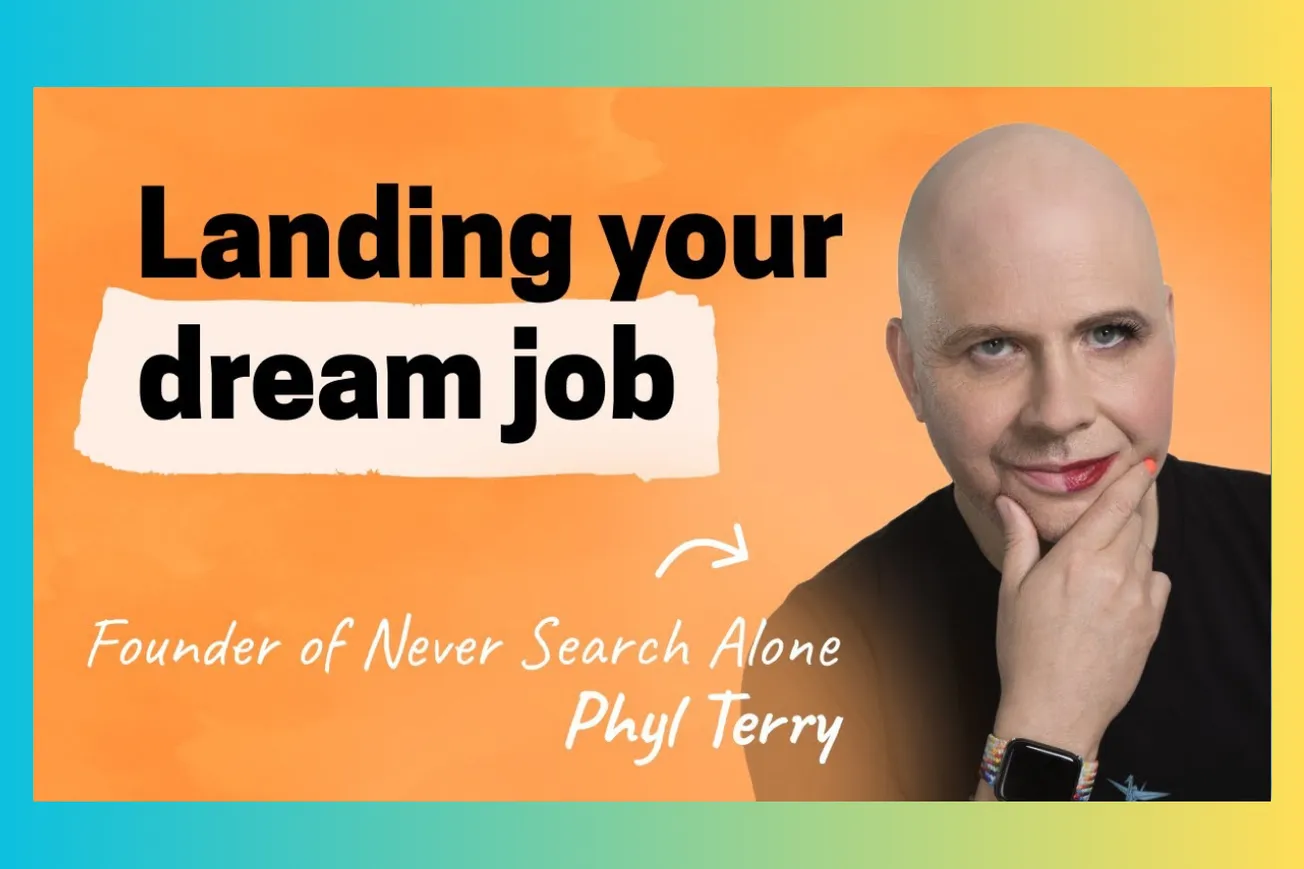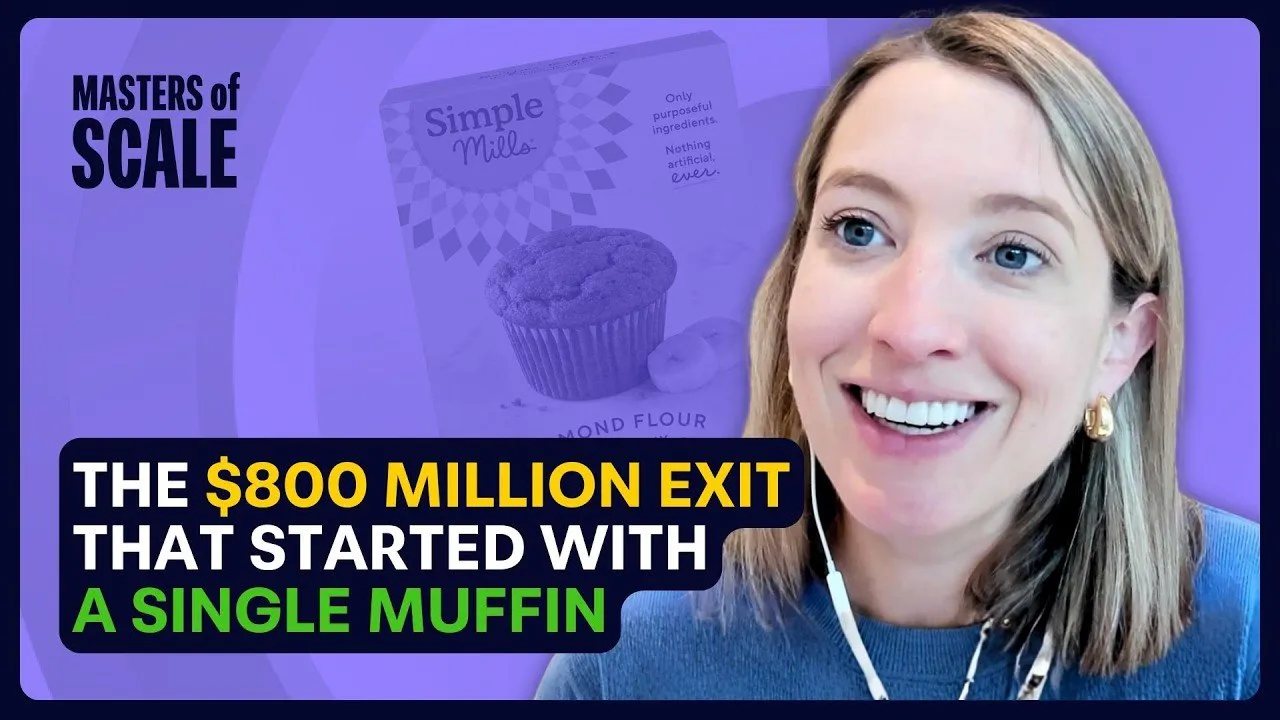Table of Contents
The traditional job search is broken. Spray-and-pray applications and solo networking don't work in today's competitive market. Phyl Terry, author of "Never Search Alone," reveals how job search councils and candidate-market fit strategies help thousands find better jobs faster—through community, strategic focus, and counterintuitive negotiation tactics.
Key Takeaways
- Job search councils create transformative support systems that flip anxiety into hope, motivation, and accountability through structured peer groups of 6-8 job seekers
- Candidate-market fit requires laser focus—you need a "spear, not a net" with 3-4 specific attributes to make yourself memorable and referable to your network
- The listening tour methodology validates your market positioning through reverse interviews, network conversations, and recruiter consultations before launching your search
- Playing to win means taking charge during interviews by creating your own job mission with OKRs, demonstrating initiative and accountability to hiring managers
- Asking for help is a sign of confidence, not weakness—85% of senior leaders credit asking for help with career advancement, while 85% of junior people avoid it
- Negotiation should focus on setting yourself up for success rather than just salary, discussing budgets, team training, and resources needed to achieve agreed-upon outcomes
- The gratitude house exercise builds confidence by recognizing everyone who contributed to your success, creating a sense of community support during interviews
- Free job search councils have launched over 2,000 groups helping people find jobs 50% faster than national averages through volunteer-driven community support
Timeline Overview
- 00:00–01:58 — Phyl's Background and Mission: Introduction to the author of "Never Search Alone" and founder of job search councils, including early career at Amazon's first acquisition and Creative Good consulting
- 01:58–08:55 — Job Search Council Foundation: Deep dive into support groups of 6-8 job seekers, including the origin story from Phyl's mother's 1960s teacher council that lasted 50 years
- 08:55–12:27 — Community Scale and Structure: Overview of 2,000+ free councils launched globally, matching system for fast vs slow seekers, and volunteer moderator training programs
- 12:27–20:19 — Impact and Success Stories: Real examples of career transformations, emotional balance management, and community testimonials from product leaders and engineers
- 20:19–30:12 — Candidate-Market Fit Strategy: Product management approach to job searching including the Mnookin two-pager exercise and listening tour methodology for market validation
- 30:12–40:37 — Strategic Focus Development: Creating narrow, memorable positioning statements and adapting to changing market conditions through iterative candidate-market fit refinement
- 40:37–49:07 — Career Path Navigation: Real-world examples of stepping down to step up, including EVP to IC transitions and strategic two-step career moves for long-term success
- 49:07–01:05:12 — Playing to Win Tactics: Job mission with OKRs creation, negotiation preparation, and four-legged negotiation approach focusing on success setup rather than pure compensation
- 01:05:12–01:10:48 — Confidence Building Exercises: Gratitude house methodology for interview preparation and inner critic management techniques for emotional balance during job search
- 01:10:48–END — The Art of Asking for Help: Counterintuitive principles showing how asking for help builds confidence, creates giving opportunities, and accelerates career advancement through strategic vulnerability
The Job Search Council Revolution: Community Over Competition
The traditional solo job search amplifies the anxiety and insecurity that everyone—from CEOs to individual contributors—feels during career transitions. Job search councils represent a fundamental reimagining of this process, transforming isolation into community support that produces measurably better outcomes.
Phyl Terry's insight stems from both research and personal experience: when you put anxious people together and ask them to be open, vulnerable, and supportive, it flips anxiety into hope, motivation, and accountability. This psychological transformation creates the foundation for more effective job searching.
- The 6-8 person structure creates optimal group dynamics for meaningful relationships while maintaining manageable logistics for consistent meeting schedules
- Fast seekers (unemployed) meet twice weekly while slow seekers (employed but looking) meet biweekly, acknowledging different urgency levels and available time commitments
- Volunteer moderators from within the job seeker community receive additional training and support, creating peer leadership that understands the challenges firsthand
- Free global access removes financial barriers, funded entirely by book sales and volunteer contributions to create a true safety net for creative destruction's casualties
- Average 3-month job search timeline compared to national averages of 3-6 months, demonstrating measurable efficiency gains from community support
The councils address the fundamental problem that capitalism's creative destruction—while generating enormous economic growth—leaves individuals to navigate career disruption alone without adequate support systems.
Candidate-Market Fit: The Product Manager's Approach to Career Strategy
Most job seekers default to "spray and pray" approaches when they lose their jobs, applying broadly without strategic focus. The candidate-market fit framework applies product management principles to career positioning, creating memorable and referable personal brands.
The core insight: "When you're looking for a job, you need a spear and not a net." Broad positioning makes you forgettable, while specific focus makes your network think of you when relevant opportunities arise.
- The Mnookin two-pager forces clarity on what you want and don't want, created collaboratively within your council for shared learning and refinement
- Listening tours provide market validation through three types of conversations: reverse interviews with former colleagues, golden question discussions with broader networks, and advice-seeking sessions with recruiters
- 3-4 attribute positioning typically includes level, function, company stage, and specific differentiators like "companies without design teams or needing design reboots"
- People are expansive but not reductive from narrow statements—they'll think of adjacent opportunities from specific positioning but never remember you from vague descriptions
- Market conditions change rapidly, requiring iterative refinement of candidate-market fit as economic conditions and industry dynamics shift
The framework acknowledges that determining market fit can be initially hard and humiliating, but provides relief by externalizing challenges as market conditions rather than personal failings.
The Listening Tour: Market Research for Your Career
The listening tour transforms passive networking into active market research, providing both validation of your positioning and activation of your professional network as listening posts for opportunities.
The golden question—"If you were in my shoes, how would you approach this?"—opens conversations that people love having while gathering crucial market intelligence. This approach positions you as seeking advice rather than asking for favors.
- Reverse interviews with former colleagues provide honest feedback on strengths, market perception, and realistic positioning given current conditions
- Broader network conversations using the golden question create investment in your success while gathering diverse perspectives on market opportunities
- Recruiter advice sessions work better than direct job requests, positioning you as seeking market insight rather than immediate placement
- 10-15 conversations typically provide sufficient data for confident candidate-market fit decisions, though the process continues throughout your search
- Monthly update notes to your entire network maintain engagement and create ongoing opportunities for referrals and support
The tour addresses job seekers' fears about receiving negative feedback by emphasizing that most conversations yield supportive advice, with occasional helpful critique that improves your approach.
Playing to Win: The Job Mission and OKRs Strategy
Most candidates approach interviews passively, hoping to be selected rather than demonstrating leadership and initiative. The job mission with OKRs approach shows hiring managers that you're already thinking like an owner of the role's outcomes.
Creating your own version of the job description with specific objectives and key results demonstrates initiative, accountability, and strategic thinking that distinguishes you from other candidates. This exercise also clarifies mutual expectations before starting the role.
- Private drafting first helps you develop sophisticated interview questions and deeper understanding of the role's challenges and opportunities
- Collaborative presentation with hiring managers after initial interviews shows your thinking while inviting their input and refinement
- Hiring manager impact often produces "blown away" reactions, as the senior Amazon leader noted: "No one has ever done this—it would make me hire them on the spot"
- Mutual alignment prevents the common problem of accepting "job A" that turns out to be "job B" by clarifying expectations upfront
- Negotiation foundation sets up discussions about resources, budget, and support needed to achieve the agreed-upon objectives
The approach requires genuine investment in understanding the role rather than generic templates, demonstrating authentic interest in company success rather than just personal advancement.
The Four-Legged Negotiation: Setting Yourself Up for Success
Traditional salary negotiation focuses primarily on compensation, missing opportunities to establish the conditions necessary for role success. The four-legged approach prioritizes discussing resources and support before addressing money.
The counterintuitive insight: companies love candidates who demonstrate they're thinking about what they need to succeed, viewing this as evidence of genuine commitment to delivering results. This approach often leads to higher compensation offers because it shows strategic thinking.
- Resource discussions should tie directly to your agreed-upon OKRs, such as tech debt budgets, team training investments, or hiring plans for understaffed functions
- Collaborative framing positions requests as "what I think I'll need to accomplish what we've agreed upon" rather than demands or ultimatums
- Company enthusiasm typically increases when candidates show they're thinking beyond their own role to organizational success
- Red flag identification helps you recognize companies that aren't serious about supporting your success, informing your decision-making
- 87% success rate for salary increases when asked appropriately, though success rates are lower in current market conditions
The approach works because it demonstrates exactly what hiring managers struggle to assess: whether someone can actually deliver results or is just good at interviewing.
The Gratitude House: Building Confidence Through Community
Job search anxiety often stems from feeling isolated and solely responsible for career outcomes. The gratitude house exercise rebuilds confidence by recognizing the community of support that has contributed to your success.
Reflecting on everyone who helped you reach your current position—from family to teachers to colleagues—creates a sense of carrying their support into interviews rather than facing them alone. This mindset shift fundamentally changes how you show up in professional conversations.
- Comprehensive reflection includes obvious supporters like managers and mentors as well as less obvious contributors like childhood teachers and family members
- Interview preparation involves re-reading your gratitude house before important conversations to activate the sense of community support
- Metaphorical presence helps you feel like you're "walking in with 50 people on your shoulders" rather than facing evaluation in isolation
- Confidence building counteracts imposter syndrome and inner critic voices that typically become louder during job search stress
- Debrief requirements with your council help parse interview experiences accurately rather than relying on anxiety-driven self-assessment
The exercise addresses the fundamental human need for belonging and community that the individual-focused job search process typically ignores.
The Art of Asking for Help: Confidence, Not Weakness
The most counterintuitive insight in job searching involves recognizing that asking for help demonstrates confidence rather than weakness. This mindset shift unlocks accelerated career growth and stronger professional relationships.
The data reveals a stark divide: 85% of people in senior roles credit asking for help with their advancement, while 85% of people in junior roles avoid asking for help because they think it shows weakness. This correlation suggests that help-seeking behavior directly enables career progression.
- Four counterintuitive principles: asking for help requires and builds confidence, functions as a giving rather than taking activity, increases independence rather than dependence, and improves rather than hurts professional reputation
- Quality execution requires doing homework, being specific about what you need, and framing requests as seeking advice rather than asking people to do work for you
- Relationship consideration matters enormously—asking appropriate people appropriate questions in appropriate ways, respecting their time and expertise
- Emotional intelligence helps you identify who to ask based on their approachability, expertise, and likelihood to provide honest feedback
- Strategic vulnerability creates deeper professional relationships by showing you value others' perspectives and expertise
The principle extends beyond job searching to ongoing career development, leadership effectiveness, and professional relationship building throughout your career.
Market Realities: Navigating Creative Destruction
The current technology job market represents a fundamental shift from the zero-interest-rate environment that enabled massive hiring without clear value propositions. Understanding these economic forces helps job seekers approach their search strategically rather than taking market conditions personally.
Creative destruction—capitalism's process of new products and services displacing old ones—drives economic growth but creates individual anxiety and insecurity for everyone, regardless of seniority or success. Recognizing this systemic dynamic removes personal blame from career disruption.
The job search council community represents an innovative response to capitalism's unintended consequences: building a private safety net that helps people navigate career transitions more effectively while maintaining the economic dynamism that creates long-term prosperity.
Practical Implications
- Join or start a job search council to transform isolation into community support, accessing tools, templates, and peer accountability that accelerate your search timeline
- Develop candidate-market fit through the Mnookin two-pager and listening tour process, creating specific 3-4 attribute positioning that makes you memorable and referable
- Conduct strategic listening tours with former colleagues, broader network contacts, and recruiters to validate your market positioning and activate your network as listening posts
- Create job missions with OKRs for target roles to demonstrate initiative and strategic thinking while clarifying mutual expectations with potential employers
- Approach negotiations by first discussing resources and support needed for success, then addressing compensation as companies typically respond positively to success-focused candidates
- Practice asking for help strategically by doing homework, being specific about needs, and framing requests as seeking advice rather than asking for work
- Build confidence through gratitude house exercises that remind you of your community support system, helping you show up authentically in professional conversations





